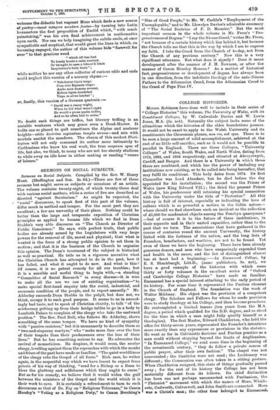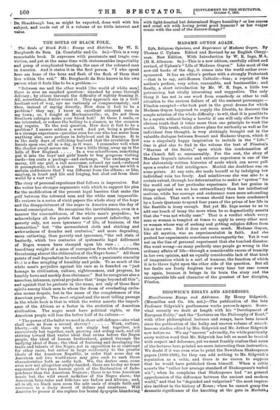COLLEGE HISTORIES.
Messrs. Robinson have done well to include in their series of "College Histories " this volume, The University of Wales, with its Constituent Colleges, by W. Cadwaladr Davies and W. Lewis Jones, MA. (5s. net). Naturally the subject lacks some of the attractions which the histories of the older foundations possess. It would not be exact to apply to the Welsh University and its constituents the Ciceronian phrase, non res, sed spes. There is to be seen a large amount of solid accomplishment, achieved at the cost of no little self-sacrifice, such as it would not be possible to parallel in England. There arc three Colleges, "University Colleges" of Wales, South Wales, and North Wales, dating from 1873, 1883, and 1884 respectively, and situated at Aberystwyth, Cardiff, and Bangor. And there is a University in which theso three are combined, and which has the power of including any institutions now existing, or to be called into being hereafter, that may fulfil its conditions. This body dates from 1874. Its first Chancellor was Lord Aberdare, but he died before the day appointed for his installation; the second was the Prince of Wales (now King Edward VII.) ; the third the present Prince of Wales, his predecessor still retaining his special connection with the University under the title of "Protector." All this history is full of interest, especially as indicating the love of culture which is so powerful a motive in the Celtic nature— where should we find elsewhere such an incident as the collection of .£1,000 for academical objects among the Penrhyn quarrymen? —but of course it is to the future of these institutions, in their separate and in their united capacities, rather than to the past that we turn. The associations that have gathered in the course of centuries round the ancient University, the history linked with the fortunes of the nation, and the long lists of Founders, benefactors, and worthies, are not to be found. Yet even of these we have the beginning. There have been already generous donors, and men who have unsparingly expended time and health in the cause, and the list of distinguished alumni has at -least had a beginning.—In Emmanuel College, by E. S. Shuekburgh; Litt.D., (same publishers, 5s. net), we have a good example of the histories with which some thirty or forty volumes in the excellent series of "Oxford and Cambridge College Histories" have made us familiar. Emmanuel has a special interest attaching to the early period of its history. For some time it represented the Puritan element in the Church of England. The foundation was the work of Walter Mildmay. His object was the provision of a competent clergy. The Scholars and Fellows for whom he made provision were to study theology at his College, and then become preachers. He contemplated a limited tenure (ten years from the M.A. degree, a period which qualified for the D.D. degree, and so stood for the time in which a man might fully qualify himself as a theologian). The first Master, Edward Chadderton, who held the office for thirty-seven years, represented the Founder's intentions more exactly than any expressions or provisions in the statutes. He went as far in Calvinistic doctrine and Puritan practice as a man could without stepping beyond the limits of Anglicanism. "In Emmanuel College," we read some time in the beginning of the seventeenth century, "they do follow a private course of public prayer, after their own fashion." The chapel was not consecrated ; the Canticles were not used ; the Lectionary was different ; the Communion was often taken in a sitting posture. When Chadderton resigned, this state of things gradually passed away ; for the rest of its history the College has not been materially different from its fellows. Its chief distinction has been one not perhaps unconnected with Puritanism, the " Platonist" movement with which the names of More, Which- cote, Cudworth, Culverwell, and John Smith are connected. More was a Christ's Elan; the other four belonged to Emmanuel. Dr. Shuokburgh has, as might be expected, done well with his subject, and made out of it a volume of no little interest and 'value.
THE SOULS OF BLACK FOLK.
The Souls of Black Folk: Essays and Sketches. By W. E. Burghardt du Bois. (A. Constable and Co. Ss.)—This is a very remarkable book. It expresses with passionate and tragic con- viction, and yet at the same time with statesmanlike impartiality and grasp of complicated bearings, the case of the coloured man in America. And it states it in the first person. "I who speak hero am bone of the bone and flesh of the flesh of them that live within the veil." Mr. Burghardt du Bois knows in his own person what it feels like to be a problem :—
" Between me and the other world [the world of white men] there is ever an unasked question unasked by some through delicacy ; by others through the difficulty of rightly framing it.
All, nevertheless, flutter round it. They approach me in a half- hesitant sort of way, eye me curiously or compassionately, and then, instead of saying directly, How does it feel to be a problem ? they say, I know an excellent coloured man in my town ; or, I fought at Mechanicsville ; or, Do not these Southern outrages make your blood boil ? At these I smile, or am interested, or reduce the boiling to a simmer, as the occasion may require. To the real question, How does it feel to be a problem? I answer seldom a word. And yet, being a problem is a strange experience—peculiar even for one who has never been anything else, save perhaps in babyhood and in Europe. It is in tho early days of rollicking boyhood that the revelation first bursts upon one, all in a day, as it were. I remember well when the shadow swept across me. I was a little thing, away up in the hills of New England In a wee schoolhouse, something put it into the boys' and girls' heads to buy gorgeous visiting cards—ten cents a package—and exchange. The exchange was merry, till one girl, a tall newcomer, refused my card,—refused it peremptorily, with a glance. Then it dawned upon me with a pertain suddenness that I was different from the others ; or like, mayhap, in heart and life and longing, but shut out from their world by a vast veil."
The story of personal experience that follows is impressive. But the writer has stronger arguments with which to support his plea for the modification of the present legal barriers that make the gulf between the coloured man and the white man impassable. He reviews in a series of vivid papers the whole story of the hope and the disappointment of the negro in America since the day of formal emancipation. He recognises the inevitableness, even in a manner the reasonableness, of the white man's prejudice ; he acknowledges all the points that make present inferiority, not poverty only, not mere ignorance "of life, of business, of the humanities," but "the accumulated sloth and shirking and awkwardness of decades and centuries," and more degrading, more outlawing, than poverty and ignorance, "the red stain of bastardy, which two centuries of systematic legal defilement of Negro women have stamped upon his race . . . . . the hereditary weight of a mass of corruption from white adulterers, threatening almost the obliteration of the Negro home." All these points of real degradation he confesses with a passionate sincerity that is a fine mingling of humility and pride. To as much of the white man's prejudice against his race as is founded on "just homage to civilization, culture, righteousness, and progress, he humbly bows and meekly does obeisance." But he recognises also a nameless, inhuman, cynical prejudice that "leaps beyond all this"; and against that he protests in the name, not only of those finer spirits among black men to whom the doom of everlasting exclu- sion means despair, but in the name of the completeness of the American people. The most original and the most telling passage in the whole book is that in which the writer asserts the import- ance of the African as a factor in the evolution of American civilisation. The negro must have political rights, or the American people will lose the better half of its culture :—
" The power of the ballot we need in sheer self-defence—else what
shall save us from a second slavery . Work, culture, liberty,—all these we need, not singly but together, not successively but together, each growing and aiding each, and all striving toward that vaster ideal that swims before the Negro people, the ideal of human brotherhood, gained through the unifying ideal of Race; the ideal of fostering and developing the traits and talents of the Negro, not in opposition to or contempt for other races, but rather in large conformity to the greater ideals of the American Republic, in order that some day on American soil two world-races may give each to each those characteristics both so sadly lack. We, the darker ones, come even now not altogether empty-handed : there are to-day no truer exponents of the pure human spirit of the Declaration of Inde- pendence than the American Negroes ; there is no true American music but the wild sweet melodies of the Negro slave; the American fairy-tales and folk-lore are Indian and African ; and, all in all, we black men seem the sole oasis of simple faith and reverence in a dusty desert of dollars and smartness. Will America be poorer if she replace her brutal dyspeptic blundering



























































 Previous page
Previous page